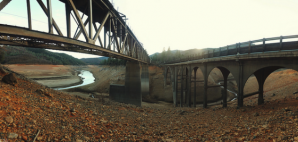California Drought Panel

California Drought Panel
What does a fourth year of drought mean for California? Stanford experts discuss potential solutions to withstand prolonged periods of drought.
California is now in its fourth year of drought. Indeed, 2011-2014 (July 1, 2011 to June 30, 2014) was the driest three year-period on record for the state. The lack of precipitation, when combined with the record warmth of 2014, has resulted in depleted reservoirs, historically low groundwater levels in many places, and 60 local emergency proclamations from cities, counties, tribal governments and special districts throughout the state. Although the state has benefited from rain events in December and February, January was exceptionally dry, and drought conditions are expected to continue.
The most recent drought has served as a catalyst for unprecedented legislative action in California, including passage of the Sustainable Groundwater Management Act and a $7.5 billion water bond. However, there is much work to be done to ensure that these and other policy actions translate into long-term water management strategies that will improve the state’s ability to thrive during prolonged periods of drought.
Water in the West is convening three experts to discuss the causes, policy implications and possible responses to California’s ongoing drought, including what a fourth year of drought will mean for the state. Topics will include:
- The current state of the drought and its physical causes;
- The role of climate change on drought;
- How the state, communities and water managers have coped with three years of drought and will deal with continued drought this summer;
- Potential long-term drought management solutions; and
- The implications of the drought for the Stanford community and Stanford’s plans for adapting to it.
Panelists:
Leon Szeptycki (Moderator) – Executive Director of Water in the West and Professor of the Practice at the Woods Institute. Water in the West is a Stanford program to foster interdisciplinary research to address issues of water scarcity in the American West. Leon is an attorney who specializes in water quality, water use and watershed restoration.
Daniel Swain – A Ph.D. candidate in Stanford’s Department of Environmental Earth System Science who blogs extensively on California weather issues, including the drought, on his website weatherwest.com. He coined the term “Ridiculously Resilient Ridge” to describe the atmospheric phenomenon that contributed to last year’s lack of rain. Daniel studies the changing character of extreme meteorological events with a focus on the role of persistent large-scale atmospheric patterns. His research includes work on the relationship between climate change and drought in California.
Barton H. “Buzz” Thompson – A leading expert in water law and policy. Professor Thompson is the Robert E. Paradise Professor of Natural Resources Law at Stanford Law School, the Perry L. McCarty Director and Senior Fellow at the Stanford Woods Institute for the Environment, and a Senior Fellow (by courtesy) at the Freeman Spogli Institute for International Studies.
Tom Zigterman - Associate Director, Water Services and Civil Infrastructure at Stanford University. Tom manages the operations of Stanford’s water supplies, including domestic water, surface water, wastewater and storm drainage systems, as well as other civil infrastructure such as dams, bridges and roads. He also chairs the Water Sustainability Working Team, which is currently planning the long-term sustainable management of Stanford’s water supply and demand.
